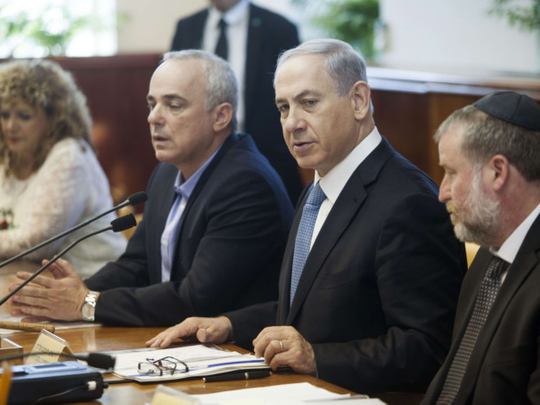
When Israeli Prime Minister Benjamin Netanyahu decided to sack two key cabinet members, thereby dissolving his ineffective coalition government and setting the stage for national elections on March 17, he did not realise that he had opened a can of worms, which is likely to diminish his chances of reassuming the premiership of the next Israeli government.
The popular slogan nowadays in Israel is “Anyone but Bibi”, Netanyahu’s nickname, in the upcoming battle to replace the embattled prime minister, whose record has been rather disappointing. His calculated move, seen by many Israeli analysts as an attempt to guarantee his return to power, remains wishy-washy.
The early indications are not very promising since it is not certain which party will join his coalition. His experience with Finance Minister Yair Lapid and Justice Minister Tzipi Livni, the two ministers who were fired, has not been promising. Now, it is believed, that he will focus on the ultra right-wing groups that support his attempt to crown Israel as a Jewish state, which will give Jews a special status while the Palestinians of the 1948 areas, a fifth of the population, will be second-class citizens. Some critics have reportedly equated the projected amendment to Israel’s so-called “Basic Law” (or constitution) to South Africa’s former apartheid laws, which gave a special status to the white minority there.
Two polls conducted last week reported that 65 per cent of Israelis do not want Netanyahu to be prime minister again, while 30 per cent still maintain they do. “Either way,” reported Mairav Zonszein, “many on the centre and the centre-left are waving the ‘Anyone but Netanyahu’ flag [and] Peace Now Director Yariv Oppenheimer, for example, said as much on his Facebook page”. He continued: “But that very mantra could just as easily lead to a government that is more explicitly to the right of Netanyahu, or centrist parties whose policies are essentially not that different from those of Netanyahu. They may push less ... [colony] construction and less friction with the United States and the European Union, but would continue the status quo of occupation, hyper-capitalism and exclusion of Arabs.”
His punch line: “This whole election cycle creates an illusion of optimism — a chance for a real transformation — while ignoring all the issues that require change: Human rights, equal rights, freedom of speech and protest and Arab-Jewish partnership. None of these, of course, can be properly addressed without ending the infrastructure of [Israeli] occupation” of Palestinian land.
In a lengthy report from occupied Jerusalem, Jodi Rudoren of the New York Times points out that “after a tumultuous year of failed peace talks with the Palestinians, a gruelling war with militants in the Gaza Strip, continuing [resistance] attacks and swelling criticism in Europe and the United States, Israel, still an adolescent nation, is going through something of an identity crisis”. As the proposed legislation emphasises, she noted, Israel would aspire to be not an Israeli homeland but one for all Jews, which Palestinian citizens find particularly offensive because their relatives are refugees who fled or were expelled in 1948. Israelis from across the political spectrum and leaders of the Jewish diaspora, according to Rudoren, “have denounced the proposals as superfluous, redundant, embarrassing, dangerous and ill-timed”. “In turn,” she continued, “the Palestinians within Israel and outside it are also virulently opposed, but they say it unmasks what they call a facade of democracy that has long been discriminatory.”
“They have the right of self-determination, but this self-determination has to be formulated in a very creative way,” Amal Jamal, a political scientist at Tel Aviv University, was quoted by Rudoren as saying. “You cannot put it in a way that makes equality impossible and makes me strange in my own home, exiles me in my own house. This is very, very problematic and that’s the sense, that’s the feeling.”
Rudoren noted that “with prospects for a two-state solution at a nadir, some analysts say the revival of the nationality bills is fuelled by fears of a single entity between the Jordan River and the Mediterranean Sea where Jews would not be a clear majority”.
In the absence of a solution in the near future, a third intifada (uprising) may be awaiting the first spark. In the meantime, Israelis should henceforth follow the footsteps of some 800 Israeli signatories to a recent letter sent to the Belgian parliament calling on it to recognise a Palestinian state. Among the prominent Israeli authors were Amos Oz, David Grossman, and A.B. Yehoshua as well as 10 Israel Prize winners, Nobel laureate Daniel Kahneman, five former diplomats and several former members of the Knesset (Israeli parliament) and five former ministers.
George S. Hishmeh is a Washington-based columnist. He can be contacted at ghishmeh@gulfnews.com










